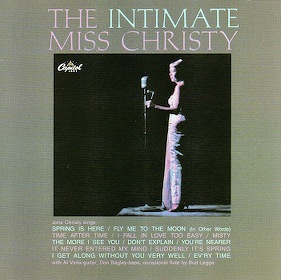
The Intimate Miss Christy sounds like a home recording done after midnight. Quiet is as much a part of it as the music itself; the lack of reverb adds to its stark immediacy. Everyone’s guard is down. The singer, June Christy, was a smiling California blonde who sang the most sophisticated sad songs in jazz. Her style was touchingly human: imperfect of pitch and often strained, but richly expressive and warm. The critics could be unkind, but audiences embraced her as soon as she stepped in front of the Stan Kenton orchestra in 1945.
By 1963, when she made this album, her long association with Capitol was nearing its end. Soon the Beatles would rule the label, which had lost interest in Christy’s costly orchestral albums, full of songs hardly anyone knew. This one seemed like a practical alternative: the tunes were familiar, the backing sparse. At its core is Al Viola, a superbly tasteful and attentive guitarist. Don Bagley’s bass is a subtle heartbeat; Bud Shank’s flute drifts in and out. Were Christy to have sung in your living room, this is how she would have sounded.
For years she’d been prominent in the ultra-hip “Cool School” of jazz singers, thanks largely to Something Cool, her 1955 hit album. In fact she was a sweet, simple girl from Illinois who had lived above her father’s gas station. At nineteen she’d begun belting out complicated tunes with Kenton’s screaming brass. But after working with the King Cole Trio in 1949, she told Metronome of her dream “to do some things with just guitar.”
She attained it when she met Viola, a Brooklyn-born Italian who played so bewitchingly that Frank Sinatra employed him from the late ‘40s through 1980. Along the way he worked with Kenton, recorded solo, and accompanied other top singers, including Christy. Viola adored her singing; for sheer emotional nakedness he rated it with Sinatra’s.
But Christy was far less confident, especially in a stripped-down setting, so Viola tried “to make things as comfortable for her as possible.” He recruited Bagley and Shank, two Kenton alumni she loved. Shank was signed to World Pacific, whose owner, Dick Bock, “didn’t like Capitol,” says Al; hence Shank’s (barely) pseudonymous billing as Bud Legge.
Viola and Christy’s husband, the ex-Kenton saxophonist Bob Cooper, each sketched a half-dozen loose charts; the playing and singing were largely ad lib. “I never knew what note she was gonna finish on,” says Viola. “But we’re talking about a real jazz talent. I think most of those tunes were one or two takes.” Viola admired her willingness to take risks, such as her modulation at the end of Misty. In turn, he, Bagley, and Shank cushioned her like a fragile flower. Shank’s phrases on You’re Nearer brush against her like butterfly wings. On Don’t Explain, Bagley’s tiptoeing bass adds eerie atmosphere as Christy becomes a woman whose lover returns home hours late, guilt on his face.
Producer Bill Miller saw the insecurity of a singer who too often drank her fears away. “Towards the end,” recalls Viola, “Bill had to say, ‘June, it’s just great! It’s just what we want.’” Viola agreed: “When Bill played it back for us, I thought, oh my God, this is beautiful!’” But when the album went almost unnoticed, he pleaded with the top brass to give it a push. “They told me, ‘No, Al, I don’t think anything’s gonna happen.’ What? One guy said, ‘It’s over.’”
Christy had one more Capitol LP to go. Just shy of forty, she drifted into semi-retirement. But well before she died of kidney failure on June 22, 1990, her Capitol albums were seen as a classic body of work. This one deserves rediscovery.